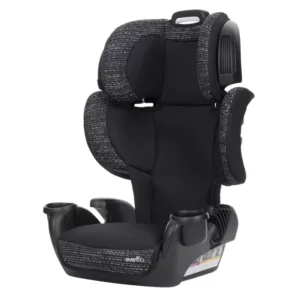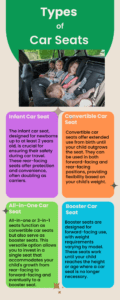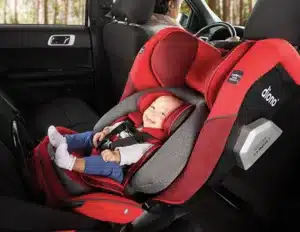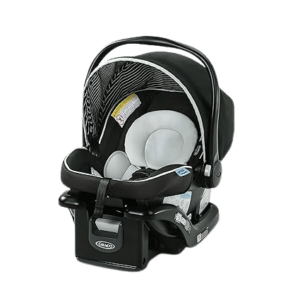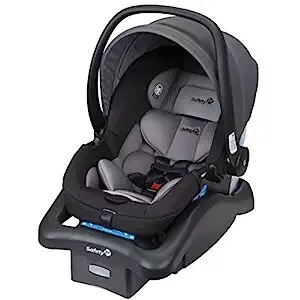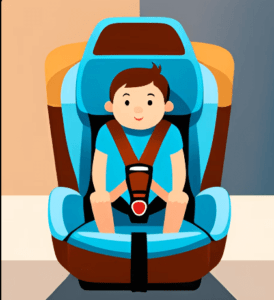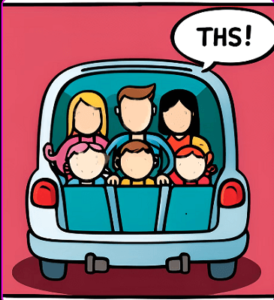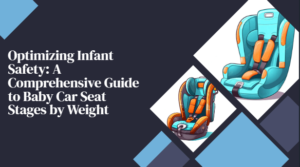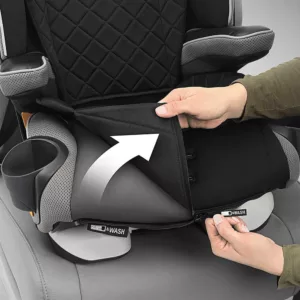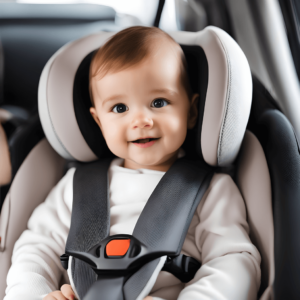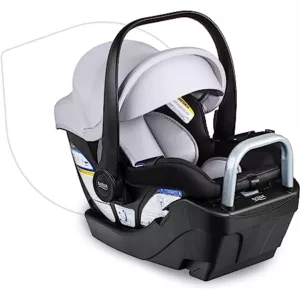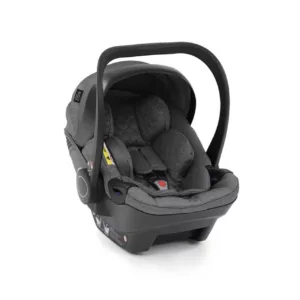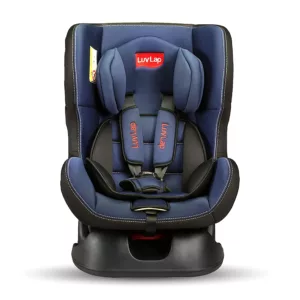Discover the definitive guide to State of Connecticut Car Seat Laws, including regulations, penalties, and tips for ensuring proper usage. Stay informed and keep your child safe on the road.
Thank you for reading this post, don't forget to subscribe!In Connecticut, adherence to car seat laws is not just a legal requirement but a crucial step in safeguarding young passengers. Let’s investigate the specifics of Connecticut’s car seat laws and understand their implications.
Info-Graphics: State of Connecticut Car Seat Laws
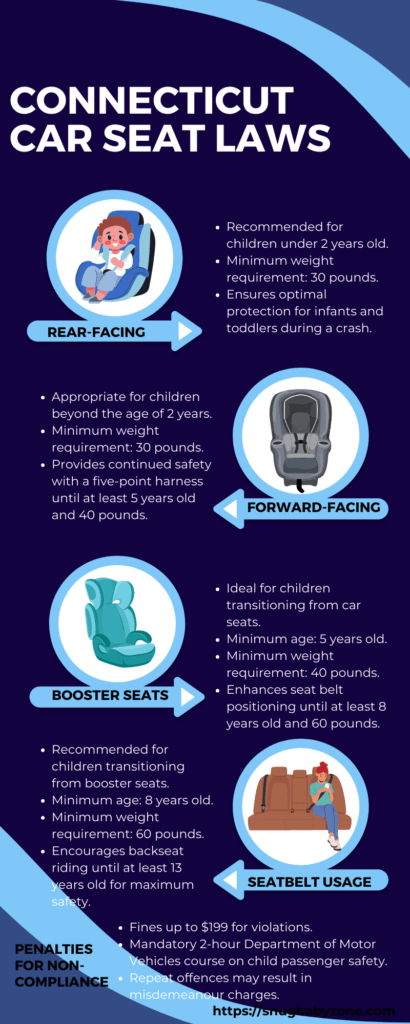
Understanding Connecticut Car Seat Laws:
Connecticut statutes, particularly section 14-100 (d), outline clear guidelines for child passenger safety. These laws mandate the use of age and size-appropriate car restraints to minimize the risk of injuries in the event of a car accident.
By Connecticut Car Seat Law, the use of specific car seats is advisable based on the age and weight of the child. Here’s a breakdown according to the recommended guidelines:
Table of Contents
ToggleRear-Facing Car Seats: Car Seat Laws Connecticut
- According to Connecticut Car Seat Law, it is advisable for children under the age of 2 to use a rear-facing car seat.
- Children are recommended to remain in a rear-facing car seat with a five-point harness until they reach a minimum weight of 30 pounds.
Forward-Facing Car Seats: Car Seat Laws Connecticut
- Connecticut Car Seat Law advises transitioning to a forward-facing car seat with a five-point harness once a child reaches at least 2 years old and weighs a minimum of 30 pounds.
- This restraint is recommended for use until the child is at least 5 years old and weighs 40 pounds.

Booster Seats: Car Seat Laws Connecticut
- Connecticut Car Seat Law recommends booster seats for children who have outgrown forward-facing car seats
- Children should use a booster seat with both the lap belt and shoulder belt until they are at least 8 years old and weigh at least 60 pounds.
- Booster seats are advisable to ensure proper positioning of the vehicle seat belt for enhanced safety.
Seat Belts: Car Seat Laws Connecticut
- Once children have met the criteria for booster seat usage, Connecticut Car Seat Law advises the transition to use the vehicle’s lap and shoulder belt.
- Children are recommended to use seat belts when they are at least 8 years old and weigh at least 60 pounds.
- Continued use of seat belts is advisable, along with back seat riding, until the child reaches at least 13 years old for optimal safety.
These guidelines, outlined by Connecticut Car Seat Law, serve as crucial recommendations to ensure children’s appropriate and safe use of car seats, aligning with the age and weight criteria specified by the state regulations. Adhering to these recommendations is essential to promote child safety during vehicle travel.
Penalties for Non-Compliance: State of Connecticut Car Seat Laws:
- Failure to adhere to Connecticut’s car seat laws can result in fines of up to $199.
- Additionally, violators must attend a mandatory two-hour Department of Motor Vehicles course on child passenger safety.
- Repeat violations can escalate to misdemeanours, adversely affecting driving and criminal records.
Ensuring Proper Installation and Usage:
Proper installation and usage of car and booster seats are vital for their effectiveness. Parents should carefully read the car seat and vehicle manuals for correct installation instructions. Additionally, attending car seat clinics or fitting stations can provide invaluable guidance on installation and usage best practices.

Impact on Driving Records and Insurance:
Violations of car seat laws can appear on driving records, potentially leading to increased insurance premiums or even refusal of coverage by some insurance companies. Prioritizing compliance with these laws not only avoids penalties but, more importantly, ensures the safety of young passengers.
Conclusion: Connecticut Car Seat Laws:
Connecticut car seat laws are crucial for protecting children during vehicle travel By comprehending and following these regulations, caregivers can markedly diminish the likelihood of injuries and fatalities in the unfortunate circumstance of a vehicular collision.
Prioritizing child safety through proper car seat usage is not just a legal obligation but a fundamental responsibility for every caregiver.

Frequently Asked Questions about the State of Connecticut Car Seat Laws:
Q: When can my child transition from a rear-facing to a forward-facing car seat in Connecticut?
- Per Connecticut statutes, youngsters are advised to occupy a rear-facing car seat until they reach a minimum of 2 years in age and tip the scales at 30 pounds or more.
Q: Are children using booster seats in Connecticut mandatory?
- Yes, children at least 5 years old and weighing at least 40 pounds must use a booster seat or a forward-facing car seat with a five-point harness until they are at least 8 years old and weigh at least 60 pounds.
Q: Can my child sit in the front seat in Connecticut?
- It is recommended that children ride in the back seat until they are at least 13 years old for their safety. However, if the vehicle does not have a back seat or younger passengers already occupy all back seats, a child may sit in the front seat as long as they are appropriately restrained.
Q: What are the penalties for not complying with Connecticut car seat laws?
- Violators may face fines of up to $199 and must attend a mandatory Department of Motor Vehicles course on child passenger safety.
Q: Can I use a second-hand car seat for my child in Connecticut?
It is generally not recommended to use second-hand car seats, as their history and potential damage may compromise their effectiveness in protecting your child. It’s best to purchase a new car seat or ensure that any second-hand seat meets current safety standards and has not been involved in accidents.
Q: How do I know if my car seat is installed correctly?
- To ensure proper installation, carefully read the car seat and vehicle manuals. Additionally, consider attending a car seat clinic or fitting station where certified technicians can inspect and assist with installation.
Q: Can a 4 year old sit in a booster seat in CT?
- In Connecticut, children must be at least 5 years old and weigh 40 pounds to use a booster or forward-facing car seat with a five-point harness. Therefore, according to state law, a 4-year-old would typically still be using a forward-facing car seat with a five-point harness,
Q: How long do kids need booster seats in CT?
- According to Connecticut law, children should continue using booster seats until they are at least 8 years old and weigh at least 60 pounds. However, it’s recommended to adhere to best practices and keep children in booster seats for longer, if possible, until they can safely fit the vehicle’s seat belt without additional restraints.
Related Resource:
- Montana Car Seat Laws
- Booster Seat Laws NC
- Virginia Car Seat Laws
- North Carolina Car Seat Laws
- Virginia Drive Smart Annual Report
- Booster Seat Laws Va
- South Carolina Car Seat Laws
- Florida Car Seat Laws
- California Car Seat Law
- NJ Car Seat Law
- Car Seat Laws Missouri
- CT Car Seat Laws
- Louisiana Car Seat Laws
- Oklahoma Car Seat Laws
- Indiana Car Seat Laws
- Washington Car Seat Laws Govt.
- Washington Car Seat Laws
- Alabama Car Seat Laws
- Arkansas Car Seat Laws
- Car Seat Laws Oregon
- NYS Car Seat Laws



